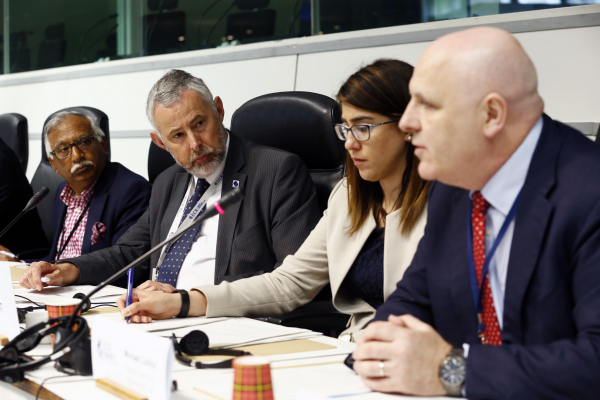Local and regional leaders discuss bringing more powers back from Brussels to regions and cities

On 16 May and in the context of the 129th plenary session of the European Committee of the Regions, the ECR Group held a meeting of its Policy Group on Subsidiarity and Localism. The meeting looked at the reform needed for the EU to do less more efficiently and brought together experts and practitioners from different fields, institutions and countries. During the meeting, local and regional leaders underlined their desire to see more powers come to cities and regions and less powers concentrated in Brussels.
The ECR subsidiarity event consisted of a panel discussion featuring speakers such as Daniele Nicolai from Italy's Artisans and Small Business Association (CGIA), Professor Klemens H. Fischer from Austria's Permanent Representation to the EU, and ECR MEP Amjad Bashir from the United Kingdom.
The meeting took place amid the ongoing work of the European Commission looking at areas where it can do less more efficiently. The Commission set-up a Task Force on subsidiarity, proportionality and doing less more efficiently' on 14 November 2017. The findings are due to be presented in September as part of the Commission President's State of the Union speech. In light of this ongoing work and the build-up to September when the European Parliament will need to provide a response to the Commission findings, the panel looked at concrete areas where matters dealt with at the EU level could be re-delegated or definitively returned to the Member States and their regions.
A set of specific examples of devolution and of the current debates ongoing in the UK was offered by Amjad Bashir MEP, who represents the region of Yorkshire in the north of England. Yorkshire is considering, in light of previous similar initiatives in Manchester and Liverpool, power devolution in the form of directly elected mayors. "Such a move would be important because where the local level politicians have power, they can represent the people better. Such elected officials could, for instance, drive inward investment into the cities and regions", Mr Bashir underlined.
Commenting on the UK case, ECR Vice-President Cllr Joe Cooney (Member of lancashire County Council and Pendle Borough Council, UK) added that bringing powers back to the Member States would not be a successful exercise if national governments themselves overregulate. "In the UK the government tends to goldplate EU legislation, which has a direct impact on SMEs. Goldplating the General Data Protection Regulation is one example. It affected both the industry and consumers negatively."
The issue of subsidiarity is also taken very seriously by the upcoming Austrian Presidency of the EU Council. Prof. Fischer, representing the Austrian government, noted that the new Austrian Chancellor supported the idea of decisions being taken as close to the citizen as possible. "The Austrian Presidency [of the Council of the EU] will carefully look at all proposals [from the European Commission] and the first question it will ask is whether these proposals are in line with the principle of subsidiarity", Prof. Fischer affirmed. He noted that the emphasis of the EU Commission's Task Force on Subsidiarity needed to be on bringing power back to local and regional governments.
Mr Nicolai explained how his organisation (Artisans and Small Business Association) had played a central role in preparations for the referendum on autonomy held in the Veneto region in October 2017. They had run a referendum analysis in a number of areas, including health, education, environment and relations with the EU. The question they had been trying to answer was: how is it that some areas in Italy have more competences than others and that they are more efficient? Is the recipe for success linked to the idea of "using less but more efficiently".
Referring to the Italian example, ECR Matteo Bianchi (Mayor of Morazzone and Member of the Italian Parliament) considered the issue of subsidiarity to be vital for the development of Europe's regions. "The European Committee of the Regions needs to help local and regional government become more directly responsible for the management of various programmes. Devolution is about devolving powers not only from Brussels to capitals, but also from capitals to regions and local authorities. One concrete example is Cohesion Policy. I am worried that managing it centrally from Rome and other capitals will not bring us the desired results."
The Policy Group on Subsidiarity and Localism was set up in 2015 by the ECR Group in the European Committee of the Regions and the European Parliament. The main objectives of the Policy Group are to pool the local, regional, national and EU expertise of the ECR political family to help ensure that decisions are taken at the lowest practicable level. The Policy Group has been responsible for considering the cost and impact of centralising decisions in Brussels, providing recommendations on interinstitutional planning and anticipating future milestones.

